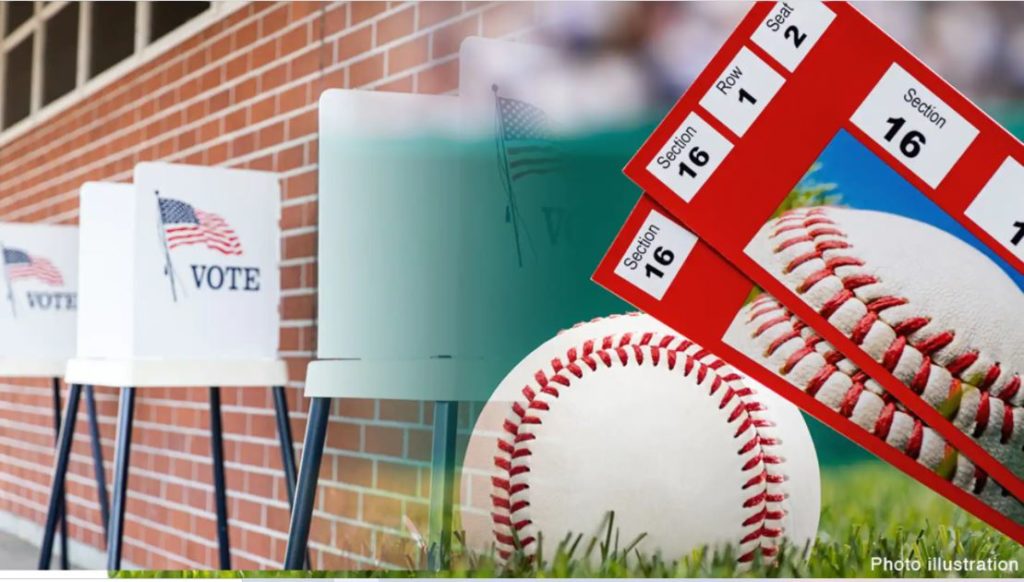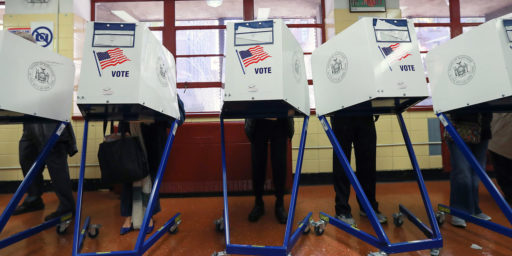A Specious Comparison of Voting Rules
No, Colorado's voting regulations are not roughly the same as Georgia's.

So, Major League Baseball has decided to move its All-Star Game from Atlanta to Colorado in protest of Georgia’s recent alterations to its election laws. As I have noted, this law objectively makes voting harder in Georgia and while we can parse out exactly how much harder they make it, one cannot ignore its rapid passage in the context of the big lie about fraud in the 2020 elections.
Let me note straight up: voting is easier in Colorado than it is in Georgia (and in specific ways that the Georgia law specifically made harder). But, many people are trying to pretend otherwise.
Reality has not stopped a number of people from trying to act like they don’t understand the difference between Colorado’s regulations and procedures and Georgia’s.
Note, Fox News: Colorado voting laws are similar to Georgia’s despite decision to move Major League Baseball All-Star Game.
The word “similar” is doing a remarkable amount of work in that headline.
The concluding paragraph of the piece is almost funny:
Fox News asked Major League Baseball if they researched state voting laws when determining a new All-Star Game site, but they did not immediately respond.
I can all but guarantee that yes, MLB did their homework and, moreover, that the author of the brief write-up for FNC did not.
Really, the piece is simply misinformation that will have the effect of a lot of people who will not pay attention to the details drawing very incorrect conclusions.
The reality is that Colorado’s election procedures are the gold standard if one is interested in making voting easier for its citizens. It mails ballots out to all citizens automatically (note that the new Georgia law forbids the unsolicited mailing of ballots). It allows for same-day voter registration for in-person voting, and its ID requirement is expansive, not restrictive and includes non-photo options.
For a run down of their rules, see: Ballotpedia, Voting in Colorado.
Look, comparing Colorado’s system to Georgia’s is like saying your flip phone and my iPhone both make calls, send texts, and can access the internet. This is all true but misses rather significant points of difference between the two.
So when Governor Kemp of Georgia says things like the following (from the FNC piece) he is being lazy and malicious:
“Georgia has 17 days of in-person early voting including two optional Sundays, Colorado has 15,” the Republican governor said. “So what I’m being told, they also have a photo ID requirement. So it doesn’t make a whole lot of sense to me.”
Well, having 15 days of in-person early voting is a just icing on the cake when you have universal mail-in voting. Think about it: if you have vote-by-mail then early in-person voting is for the handful of people who don’t want to vote by mail instead of being a way to avoid long lines on election day.
To quote a Colorado Public Radio piece (Colorado Vs. Georgia Voting Laws: What Are The Differences?):
There’s a major difference between the states, though: Colorado votes by mail. Every registered voter receives a ballot about 15 to 20 days before the election. And instead of waiting in line at a polling station, the vast majority simply drop the ballot in a mailbox or a secure dropbox.
According to information from the Secretary of State, 99.3 percent of Colorado primary voters used one of those methods last year.
So, while it’s true that Colorado has fewer days for in-person voting, it also has far less demand for in-person voting. Voters rarely encounter lines here. And the ultimate result of Colorado’s system is extremely high turnout.
Georgia’s new law moves the state away from Colorado’s vote-by-mail approach, pushing more voters to show up in person.
And, as noted, Colorado has much less stringent ID requirements, including non-photo ID and a long list of options. Further, you only need to provide ID for mail-in voting the first time you vote by mail. It just isn’t the same thing.
Again, Colorado Public Radio:
Colorado does require some form of ID when voters register for the first time, and whenever they vote in person. But the state accepts 16 different forms of identification. The options include common identification cards like a driver’s license, a U.S. passport, or government employee ID — but Colorado also accepts Medicare and Medicaid cards, college IDs, utility bills, bank statements and paychecks.
Colorado does not require identification for mail voting once a person is registered. Instead, the state mails a ballot to the person’s home, and then matches their signature against a database when the ballot is returned.
Quite frankly, I hope this leads a lot of people who might not pay attention to the details to see how Colorado’s system works and start to see why some rules promote voting and others discourage it.
For more see WaPo, The unserious comparisons between Colorado’s voting laws and Georgia’s new one
And if you want to ramp up the ridiculous, there’s Dan McLaughlin piece at NRO: The Baseball All-Star Game Is No Icon of Honest Voting which runs down a number of problems/”scandals” with All-Star voting:
Now, the voting system we use for choosing our government is run differently, has much more serious stakes, and presents different challenges than the MLB All-Star Game. But human nature is a constant: people will try to game your voting systems if you do nothing to protect them, and you’ll end up having to work ever harder to win back public confidence in the integrity of your elections. MLB should consider its own history before it lectures anybody else against the evils of having rules to protect the ballot.
Because, you know, that all just proves the hypocrisy of the MLB and teaches us all about the need for electoral integrity. Or something.






Want to see if they really believe Colorado’s voting laws are effectively the same as Georgia’s new laws? Ask them if they’d be ok if Colorado’s laws were replicated in Georgia and the rest of the states.
Close, but not quite. There are ways to evade having a ballot mailed to you if you work at it. We are an automatic voter registration state, but every time the “automatic” part registers you, the county clerk sends you a postcard you can return indicating you don’t want to be registered and your name is removed. If you’re willing to accept enough limits on your life, you can avoid the “automatic” part entirely. I know people who unregistered when the Trump fraud commission started demanding states turn over personal information about their registered voters. Don’t vote for long enough and you get marked inactive and don’t get a ballot. Felons who are still in prison don’t get a ballot.
I don’t remember the number of eligibles who aren’t registered, but the last time I saw it I was surprised that so many people could stay out of the system.
@Michael Cain: Fair enough and I think that there is some caveat that could be stated about “active” voters. But if you have to actively avoid, I am fairly content with the description as given.
True automatic registration is tricky and I don’t think anywhere in the US has it. (Although many countries do, but they have universal ID).
It was not a serious critique of D pushback on Georgia’s new law. Or GA based corp pushback. The comparison was stupendously unserious.
It was a quickie non sequitur messaging ploy designed for RW media outlets to write an outraged headline designed to engage low-information outrage fetishists.
You are always the victim of the liberal elite is the core message. Which is chilling.
@Steven L. Taylor: I’m looking forward to the ACS estimates for 2020 for the registration rate among eligible citizens in Colorado. For 2018, it was 66% — ie, a third of eligible citizens were not registered. Several/many states had a higher registration rate. Automatic transfer of records to the Secretary of State by other state agencies didn’t start until July, 2020. I have seen claims in the newspapers here that by this past November the number had increased to as much as 90%, but without references.
It did not happen in a vacuum. This law happened because Trump lost. It happened because Perdue and Loeffler lost.
Serious critiques have to acknowledge that the reason for the law is the Big Lie.
A solution absent a problem.
If you can’t win change the rules.
Absent malfeasance or fraud there was no reason for this law beyond White Votes Matter More.
When the SC gutted the VRA, it opened the door to this crap.
I sincerely hope GA voters, and those in other states, are mad and engaged and will vote in 2022 to knock this literal anti-democratic notion down hard.
Expanding the voter pool is an unalloyed moral good.
Steven, I liked the way you did this post. Rather than spend a lot of time refuting Fox News’ nonsense point by point, you merely pointed it out and then went into a detailed description of the Colorado system. Put another way, you used Fox’s specious “point” to pivot to what you wanted to talk about, rather than engage with them. The result ended up providing useful information and made for an interesting read.
Wonkette: Republicans Just Lying Their Asses Off About Colorado Voting Laws
@Steven L. Taylor: Washington State has an interesting (to me at least) variation on automatic registration. When I moved back from Korea, I registered a change of address with the DMV from my previous US address. One of the questions in the chain was “would you like to register to vote while you are visiting this site” to which I initially checked “no.” The site would not pass me through to the next step until I had checked “yes” (I clicked “no” four or five times), but I have never received either voter registration documents or a ballot since I returned to the states. I assume computer glitch on the not passing through for the “no” choice.
@de stijl:
I’ve been trying to figure out what a serious case for this spate of voting legislation would look like. We either get gaslighting (Colorado is ‘similar;’ “GA has actually made voting easier”) or misdirection (“Voter confidence demands action and this legislation goes against fraud”). The Republicans have decided that it is easier to convince people of falsehoods (regardless of how easily these things are to debunk) than to make an affirmative case for voter suppression.
There was a time when the debate was more tangible
– an informed electorate is necessary for a well functioning democracy, so we need a means to limit the vote to the ‘educated’
– only the gentry should vote because they are the ‘makers’ and full enfranchisement would end with the ‘takers’ empowered to grant themselves free stuff at the ‘makers’ expense
Conservative think tanks really need to step up their game. They need to come up with better specious arguments supported by dubious research. The bold-face lying isn’t going to win over anyone who is persuadable.
@Scott F.: The first, limiting to the ‘educated’ would be dangerous to GOPs as education now correlates with voting D, which I assume is why you put scare quotes on educated. I look at The American Conservative now and again. They’ve lost all the good writers and they are deep into airy philosophizing with seldom anything relevant to the real world. But they’re skating pretty close to overt Bill Buckley style racism, and not only wrt/ voting. As is the whole GOP party.
@Michael Cain:
The state publishes monthly figures, but I haven’t researched to see if there are summaries – they are obvious on that site.
If you look at the latest month data by registration source, it shows that about 95% of registrations happened at the DMV. Then if you go and look at the DMV numbers, about 15% declined to register for the most recent reported period.
So I think the most common way to avoid registering is to decline when getting a new ID or driver’s license, since that’s where the vast majority of people actually get registered.
Also, Colorado has pre-regisration. When my daughter got her driver’s license at 16, she pre-registered to include a choice of party affiliation. Once she’s 18, she’ll start receiving ballots in the mail.
Apropos of the other thread on independents, for the most recent data, 61% of registrants picked “unaffiliated.”
@Teve:
To Rs, black voters waiting in line for 8 hours in metro Atlanta to cast their vote is a feature not a bug.
At National Review, Kevin Williamson is making the argument that less voters is better.
Technically, it presents as a devil’s argument, but the implication is pretty damned clear. R’s are tipping their hand repeatedly recently.
The “quality” of votes should matter more than the quantity. Guess what determines “quality”?